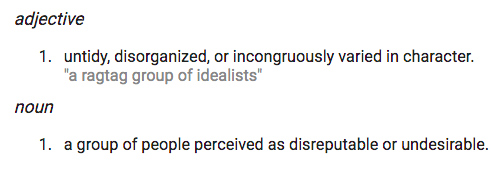I think educators are often surprised by the ragtaggediness of our classrooms at the beginning of the school year. We tend to see them in comparison with the previous year - you know, the one we worked all year until they could finally respond to commands and march in straight lines. No matter the grade level, there is always a period of time at the beginning of the year where the teacher goes home and thinks that discipline is not what it used to be. We get exhausted quite easily at the beginning because we have to put so much effort into trying to make them into what we worked a year to achieve with the last class.
That's when it's important to step back, take that cleansing breath the counselor talks about, and reflect. How did we do it last year? When did it begin to "click"? When did they start to feel like my class? I guarantee it wasn't on the first day.
And that's OK.
The more I study about our first president, the more I realize that he was not the ideal leader, the perfect president, the best military strategist, the greatest politician, or the most romantic, the most eloquent, the strongest, etc. Not at first, that is. He, too, was ragtag in the beginning. He worked his way through hardships that naturally fell on his young shoulders. He failed to achieve the gentry by forcing things to bend at his will. He bumbled through his military beginnings, even leading the British into an ugly mess that started the French and Indian War.
In that incident in the Ohio Valley, George Washington must have stood with his mouth agape, surprised and appalled that his choices had brought his army to utter disaster. He promptly did what many of our students do: he tried to cover his tracks and sweep the massacre under the rug. He did what so many politicians and fourth graders do: he backtracked and made excuses. At the same time, we must appreciate that the horrible incident is a part of our first president's past. We must appreciate the changes that his leadership underwent in the development of his character and beliefs.
Every time I hear the word in a documentary or read it in a book, I think about George Washington. From the beginning, he was critical of the men in his charge, complaining that they were undisciplined and lacked drive. And every time, I remind myself that he was probably thinking about his own shortcomings. He, too, was untrained, but he was willing to improve. He, too, made mistakes, but he was willing to learn from them.
That will is what drove him to accept help from the right generals and consultants. There is a point where you can see the army turn around, stand tall, and act like a well-oiled machine, a point where the system takes charge because one man developed into more than a ragtag leader of a ragtag collection of dirty soldiers.
It's the greatest lesson I learned since my 2018 residency at Washington's mansion in Virginia - Mount Vernon. It is the lesson of George Washington's Growth Mindset - the drive that delivered this great man from ignorance to wisdom through the course of his life. And it is the lesson that I wish to achieve with my students: ragtag today, but future wise. We are works in progress, not only defined by who we are, but by who we will become.
This summer, I took part in a live web seminar with the folks at Mount Vernon - part of my continuing connection to the education department there - in which I shared the idea that every good story has a character who changes throughout the plot - whether the fictional character in a novel or motion picture, or a figure from our favorite period in history...
...Or that student or teacher in a Midwestern elementary classroom.









































